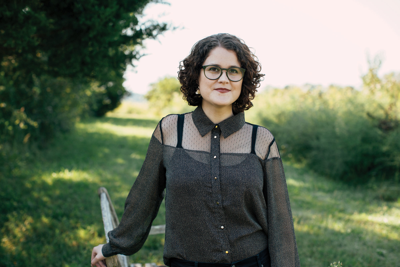
Each year, the American Library Association’s Office for Intellectual Freedom tracks the requests that patrons make to remove materials from their community, school, university and prison libraries. Of the 10 books on 2019’s Most Challenged Books list, eight feature LGBTQ characters.
Growing up as a teen in the rural South, Nashville author Erica Waters never came across any book with queer characters, much less bisexual characters like herself.
“I’m well aware that some schools may choose not to include my book in their libraries because of its queer characters,” says Waters, whose debut YA novel Ghost Wood Song was published by Harper Collins in July. “And what a shame! How many queer students are missing out on the chance to read books about people who make them feel more at home in their own skin?”
Though teens need to read coming-out stories, it is equally vital that they experience tales of magic and adventure that happen to have queer characters. While Waters’ eerie and atmospheric novel features a bisexual main character named Shady Grove, the supernatural plot focuses on intergenerational trauma and familial love rather than sexuality. Ghost Wood Song takes place in a rural Florida town where Shady Grove lives in a trailer with her mother, siblings and stepfather. She plays folk songs on her inherited fiddle, which can also call up ghosts when played with enough sorrow. After someone murders her stepfather and the police arrest her older brother Jesse for the crime, Shady Grove decides to use her fiddle to solve the murder and set her brother free. However, every time her music calls up ghosts, a dark, shadowy man appears and attempts to control her movements. Meanwhile, in Shady Grove’s social life, she’s torn between a longtime crush on her fellow bandmate Sarah and her new crush on the cowboy-hat-wearing Cedar, who plays the bluegrass folk songs she adores.
While more and more young adult books are being published with queer characters, there’s still a lack of representation, especially in Southern settings. “It’s important to me to write queer characters,” says Waters, “especially queer characters who are Southern and low-income, because there are currently very few characters of that demographic in YA. It makes queerness seem like something that belongs to other people, something not accessible to you if you live in a trailer in rural Florida, if your parents are blue-collar, if you aren’t on your way to an ivy league university.”
Originated by Corinne Duyvis, the term #OwnVoices is used in marketing to identify books written by someone with a marginalized identity and featuring characters that have the same marginalized identity. For example, Ghost Wood Song is tagged as #OwnVoices because it’s written by a bisexual author and has a bisexual character. But the designation comes with some complications.
While the #OwnVoices label can help teens find books representing their identities, it can also be a burden for queer and marginalized writers. “Queer writers are often asked to speak only on queerness when they might rather talk about writing craft or other topics,” says Waters. “Readers can sometimes be intrusive, asking personal questions they otherwise wouldn’t. And some queer creators feel pressure to ‘perform’ their queerness to prove their right to write books like this.” Waters makes it clear that these are issues all marginalized writers face, not just queer authors.
In a recent Medium article, Leah on the Offbeat author Becky Albertalli writes about the enormous amount of pressure authors face to come out for their audience and to be deemed queer enough. “But labels change sometimes,” Albertalli writes. “That’s what everyone always says, right? It’s okay if you’re not out. It’s okay if you’re not ready. It’s okay if you don’t fully understand your identity yet. There’s no time limit, no age limit, no one right way to be queer.”
The only way to alleviate the pressure is to have more queer voices and more queer characters in YA literature. No one person can encapsulate an entire identity, nor should they be expected to.
Thankfully, queer YA novels are becoming more popular, and hopefully, this will lead to more publishing deals for queer authors. This month, Aiden Thomas’ YA novel Cemetery Boys became the first novel by a transgender author to make it on The New York Times’ top 10 YA bestseller list. Waters also plans to continue writing queer characters. Her second book, The River Has Teeth, which is set to release next summer, features a predominantly queer cast. Like Ghost Wood Song, it’s a dark, contemporary fantasy with witches, monsters and sisterly love. It takes place in a nature park inspired by Bells Bend Park and Beaman Park.
“I am grateful to be able to write queer characters and to give young people a chance to see themselves represented in a story,” says Waters.
Magical, lyrical and moving, Ghost Wood Song belongs in the hands of any reader who enjoys YA fiction with a dose of the fantastical.





